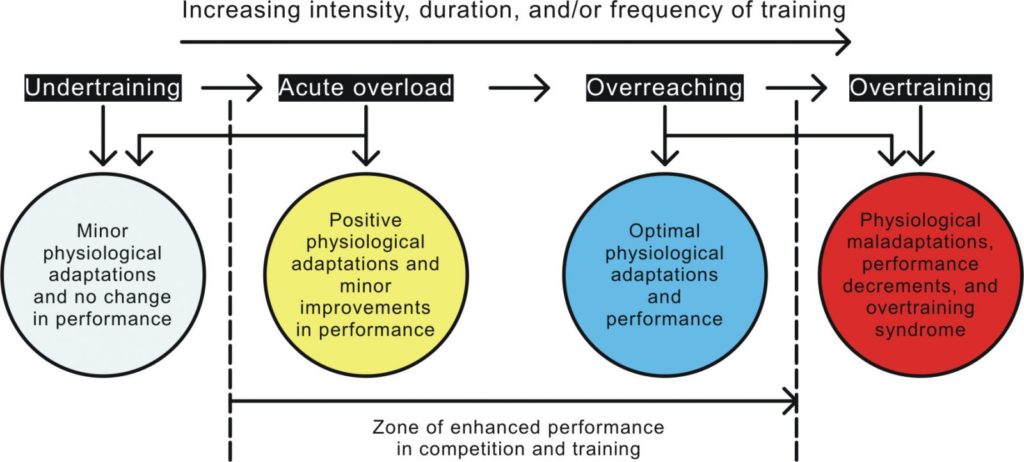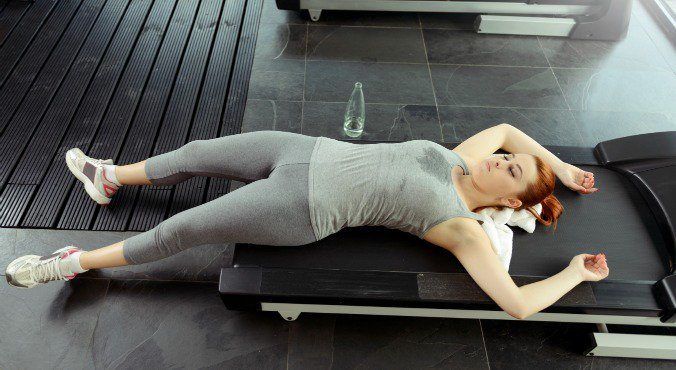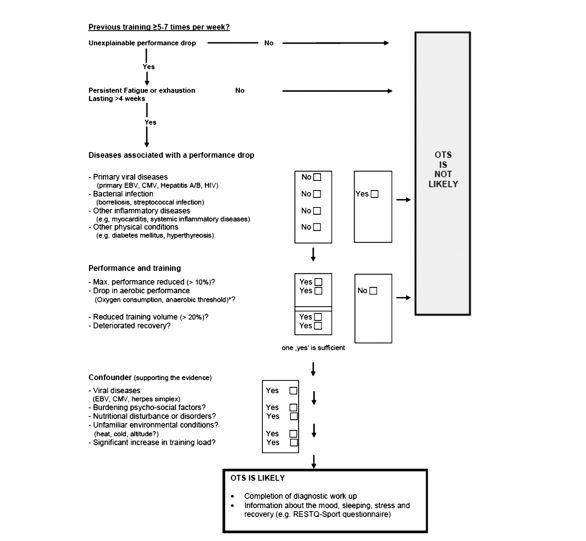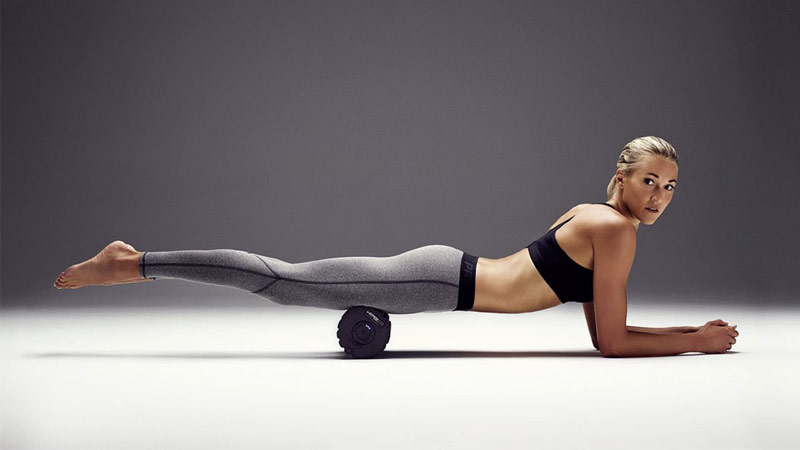
Overtraining Syndrome: Signs, Symptoms, Causes & Treatments
Overtraining doesn’t just put the brakes on your progress in the gym. It can leave you exhausted, depressed and feeling like you’ve been hit by a 10-ton truck.
The pressure on us girls to look great is at an all-time high. We’re bombarded with super-sexy Instagram models every day. They’ve got slim figures and curvy assets, as well as flawless skin and booties to die for.
We want to look like them. And hey, we’re not afraid to work hard to get there! But more exercise isn’t always the best option.
Overtraining is a real issue for the girl who grits through sweat-heavy circuits and hour after hour of grueling cardio.
It’s easy to think that doing more might be better. And when your motivation is high, you might find yourself working out that little bit more frequently or harder than you really should.
Eventually, fatigue will catch up on you.
Check this; if you’re constantly feeling sore, picking up more frequent illnesses or suffering a big dip in strength and fitness, you’re probably overtraining.
Here’s what you to know to avoid gym burnout and keep your targets in sight…
Progressive overload, adaptation and fatigue
More isn’t always better. Train too hard without recovery and you might find yourself in a dark place called the overtraining syndrome.
To carve out the body of your dreams, you must work damn hard. If it was easy, we’d all be walking around with a bangin’ butt, toned abs and athletic legs.
Unfortunately, it takes hard work, dedication and a solid steel resolve.
To boost stamina or develop muscle tone you have to get out of your comfort zone. And the fitter you get, the harder you must work to keep upping the ante.
This is what’s known as progressive overload.
Getting things ‘just right’ in the gym
Remember the story of Goldilocks and the three bears?
In the story, one of the porridges was too hot and the other too cold… but the one in the middle was just right.
Your approach to fitness should be the same. Check out the image of the ‘training continuum’ below. It shows what happens as you throw more and more intense or frequent exercise into your schedule.

Less isn’t more; but more isn’t more either
Improving fitness is about constantly aiming to be better in the gym. It’s only by lifting heavier, running faster and jumping higher that you go from a young pretender to the queen of fitness.
The results you get from fitness and exercise work along a continuum. Here’s what happens when you work out:
#1. Undertraining
If you don’t work hard enough or often enough and time in the gym is hugely outweighed by rest days, you’ll never improve. In most cases you’ll actually lose fitness because, well, you aren’t exercising often enough girl.
Don’t expect to get better if you aren’t working for it!
#2. Acute overload
If you train hard and follow principles of progressive overload, you reduce the time your body has to recover. You overload your body and in the short term this leads to soreness and a drop in performance (if you’ve ever tried to work out while sore you know why this is true).
Come back to the gym a day or two later though and you find you’ve actually supercompensated – a term used to say you’ve improved.
We call this acute overload because it happens in the short-term over a few days at a time.
#3. Overreaching
If you’re serious about your training and doing what you can to be the best, you’ll be working out to train ‘peak’ fitness levels.
Using acute overload for a few weeks at a time and purposely pushing yourself is key. If you then take your foot off the gas after few weeks and replace your tough sessions with some less-intense training (thereby reducing fatigue), you’ll supercompensate even more than with acute overload.
You’ll bounce back and perform with much higher fitness levels. Like a fitness slingshot!
This is called overreaching – you’re literally reaching out to a higher level of fitness and grabbing it with both hands.
#4. Overtraining
If for whatever reason you decide to keep pushing your body during an overreaching phase, you’ll eventually burn out. Remember, you’re working hard and not giving yourself much recovery. After a while, your body’s bound to bite back.
And while overreaching is beneficial, overtraining isn’t!

Key Point: Improving your performance and physique is about balance. Don’t work hard enough and you won’t improve… but smash the gym hard for too long as you’ll soon burn out.
What is overtraining?
Overtraining is a syndrome causes by excessive training that results in a long-term decrease in sports performance. It can take months or sometimes years to recover from.
There’s a big difference between feeling a little tired from working out and overtraining. Fatigue caused from a couple of weeks of hard training (or a few too many late nights!) is completely normal.
As you know from the continuum above, pushing your body for short spells at a time is just part of the process. And it kind of comes with the territory.
In one study, expert researchers Halson and Jeukendrup aimed to properly define overtraining. After reviewing a bunch of papers, they came up with this detailed explanation.
“The accumulation of training and/or non-training stress resulting in long-term decrement in performance capacity with or without related physiological and psychological signs and symptoms in which restoration of performance capacity may take several weeks or months” [1]

If your performance doesn’t drop, you aren’t overtraining
The big defining point with overtraining is the decrease in performance associated with it.
Whether that’s a reduction is speed, stamina or fitness, it doesn’t matter. If the weights you usually throw around are feeling heavy and harder than normal you can use that as a warning sign. But one thing’s for sure – if you’re feeling tired but you’re just as fit and strong as normal, you’re not overtraining…. you’re just a little tired.
You just need to woman up!
The myth around overtraining
Many people believe that overtraining doesn’t exist. That it’s just laziness or lack of motivation.
In reality though it’s pretty common – especially in pro athletes that train hard for hours and hours each day.
For example, one study found that as many as 15% of females overtrain during a competitive season [2].
So yeah, it does exist girl. And it’s something you really need to watch out for.
Key Point: Overtraining is a complex but real syndrome that affects as many as 15% of female athletes.
What causes it?
Overtraining is the chronic lack of balance between training and recovery. It’s that simple.
In the simplest terms, overtraining is caused by too much training and not enough recovery. And that’s true. Without the right amount of rest time you’ll never allow yourself enough energy to grow back bigger and stronger.
But here’s something you probably didn’t know…
It isn’t exercise alone that can result in overtraining!
The term ‘overtraining’ is pretty misleading
Let’s break down the term. ‘Over’ – ‘Training’.
You’d think that it was just high levels of exercise training that resulted in fatigue and exhaustion. But it turns out it’s not.
Your body deals with all stressors the same. Whether that’s stress from exercise or stress from relationships, work, poor diet or anything else that’s on your mind.
Your risk of overtraining is about the ‘sum of all stressors’. Not just exercise.
High stressed athletes are at higher risk of fatigue
Studies show that when regular gym-goers are more stressed, they don’t perform as well.
For example, one research paper found that stress from exams resulted in reduced strength and athletic performance in the squat. It also put the athletes at higher risk of overtraining too.
And another found that higher levels of stress hormones (cortisol) negatively affected muscle growth, grip strength and catabolic effects on lean tissue.
It’s important to reduce stress where you can. When you’re working hard in the gym you can’t afford to bring extra ‘baggage’ with you.
You need to ditch the worries and concerns and focus on what’s important.
Key Point: Life stress and ‘non-training load’ can speed up the onset of overtraining. Combining stress with hard training will soon lead to negative results.
Overtraining is actually a complex, multi-factorial syndrome
The differences between overreaching and overtraining are subtle.
There are hundreds of research studies out there that have tried to understand where one becomes the other, but the only real difference between the two is recovery time.
One thing’s for sure though…
Overreaching has you feeling tired, fatigued and unmotivated. But it’s something that will result in higher levels of performance once you throw in some rest and bounce back.
But overtraining has a much wider range of symptoms attached to it, and can leave you in a dark, lonely place where everything feels like hard work.

Key Point: The real difference between overreaching and overtraining is the amount of rest time needed to fully recover. However, overreaching leads to an improvement in performance, whereas overtraining doesn’t.
Signs & Symptoms
A syndrome is something that has no single effect, but all symptoms are related to each other. In overtraining, performance is lower than normal.
But that isn’t the only sign or symptom to look out for.
Remember, it’s a syndrome – chances are if you’re truly overtraining, you’ll be suffering from a few of these. Not just one.
Here are just a few of the warning signs to look out for:
- Elevated (or sometimes lower) morning resting heart rate
- Loss of energy, poor sleep and lack of motivation
- Feelings of stress and anxiety
- More frequently suffering coughs, colds and short-term illnesses
- Reduced cardio fitness – endurance, stamina and maximal running velocity
- Higher levels of stress hormones and lower testosterone levels
- Infrequent menstrual cycles (or they completely stop)
- Loss of strength, power and muscle mass
Signs and symptoms are very individualistic
The warning signs can vary massively from one woman to the next.
For example, one girl might suffer from anxiety and low mood, whereas another might find that it’s only her heart rate suffers. Others might pick up a common cold more regularly.
There are reports of high level female athletes that suffer from reduced testosterone levels for example, and then others that don’t.
Check out our article on normal testosterone levels in women for more info on why this hormone makes all the difference to your physique and mood.
Let’s not forget – the difference between overreaching and overtraining is the length of time it takes for these symptoms to disappear. They tend to be much milder during overreaching phases and take only a few days or weeks to recover from.
Self-diagnosis
Chances are, if you’re performance in the gym is getting worse and you’re suffering two or more symptoms from the above warning signs, you’re overtraining.
If you want to be ultra-objective there is a formal checklist you can follow to diagnose overtraining. It’s used as part of the ECSS consensus statement on prevention, diagnosis and treatment of the overtraining syndrome [3].
Here’s an image of what the flowchart looks like…

Treatment
The simple solution here is rest and time.
If you find yourself in a hole and you know for a fact you’re overtraining, you need to do the following:
- Reduce training volume and intensity right away
- Eat more protein and carbs
- Eat more calories in total – more energy is needed to help you recover
- Prioritize sleep – it’s your number one recovery tool
- Once on the mend, build up exercise tolerance gradually
Conclusion
The overtraining syndrome is caused by excessive exercise and life stress alongside reduced recovery time. It affects many female athletes and is something you really need to watch out for.
Associated with a drop in performance, low mood and poor sleep patterns, recovery from overtraining can take months.
It’s far better to avoid it altogether!
Enjoyed this read? Check out these related articles if you did:
- What is post-exercise fatigue syndrome?
- Should you take pre workout before running or cardio?
- A girl’s guide to metabolic conditioning




